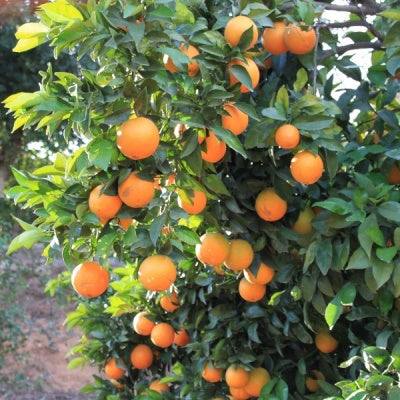Round, fruity, delicious!
Oranges are one of the most widely cultivated citrus fruits in the world.
Welcome to our blog post dedicated to the humble yet remarkable orange! This juicy citrus fruit is not only a staple in our diet but also a symbol of freshness and vitality. Let's dive in and discover some fascinating facts about oranges.
Facts about oranges :
1. Popular fruit: On average, every German consumes around six kilograms of oranges per year.
2. Oranges like it cold. 1-6 degrees Celsius is the optimal temperature for storage.
3. The orange is also called Apfelsine in German. This name is derived from "apple from China," as the golden fruit originally comes from Asia.
4. Oranges are essentially a year-round product. Therefore, oranges are available even in summer.
5. The color of orange peel does not depend on sunlight or heat, but on temperature fluctuations between day and night. Therefore, the ripeness of the fruit cannot be determined by a greenish or orange peel color.
6. Origin and History: Oranges originate from Southeast Asia and were first cultivated over 4,000 years ago. They have a long history of worship in various cultures, from ancient Greek gods to Chinese New Year celebrations.
7. Variety : There are more than 600 varieties of oranges worldwide, varying in size, color, flavor, and texture. From sweet navel oranges to sour blood oranges, there's a variety to suit every taste.
8. Health Benefits: Oranges are not only delicious but also extremely healthy. They are rich in vitamin C, which can boost the immune system and promote collagen production. They also contain antioxidants that can help fight free radicals and reduce the risk of heart disease and certain cancers.
9. Versatility in the kitchen: Oranges are extremely versatile and can be used in a variety of dishes. Whether as juice, in salads, desserts, marinades, or even as an ingredient in savory dishes—the possibilities are endless.
10. Symbolism and customs : Oranges also have symbolic significance and are associated with different traditions and customs in different cultures. In some countries, they are considered a symbol of good luck, while in others, they are viewed as a sign of prosperity.
11. Sustainability and environmental awareness: Orange cultivation requires careful management of natural resources, including water and soil. Many producers are increasingly committed to sustainable farming methods to minimize environmental impacts and promote biodiversity.
The structure of an orange:
Each segment is surrounded by a thin membrane (endocarp), and the entire fruit is enclosed by a two-part shell. The inner layer of the shell is white (albedo), while the outer layer turns orange when ripe (shell/exocarp).
The ripe fruit skin contains numerous oil glands, which emit an aromatic scent.




